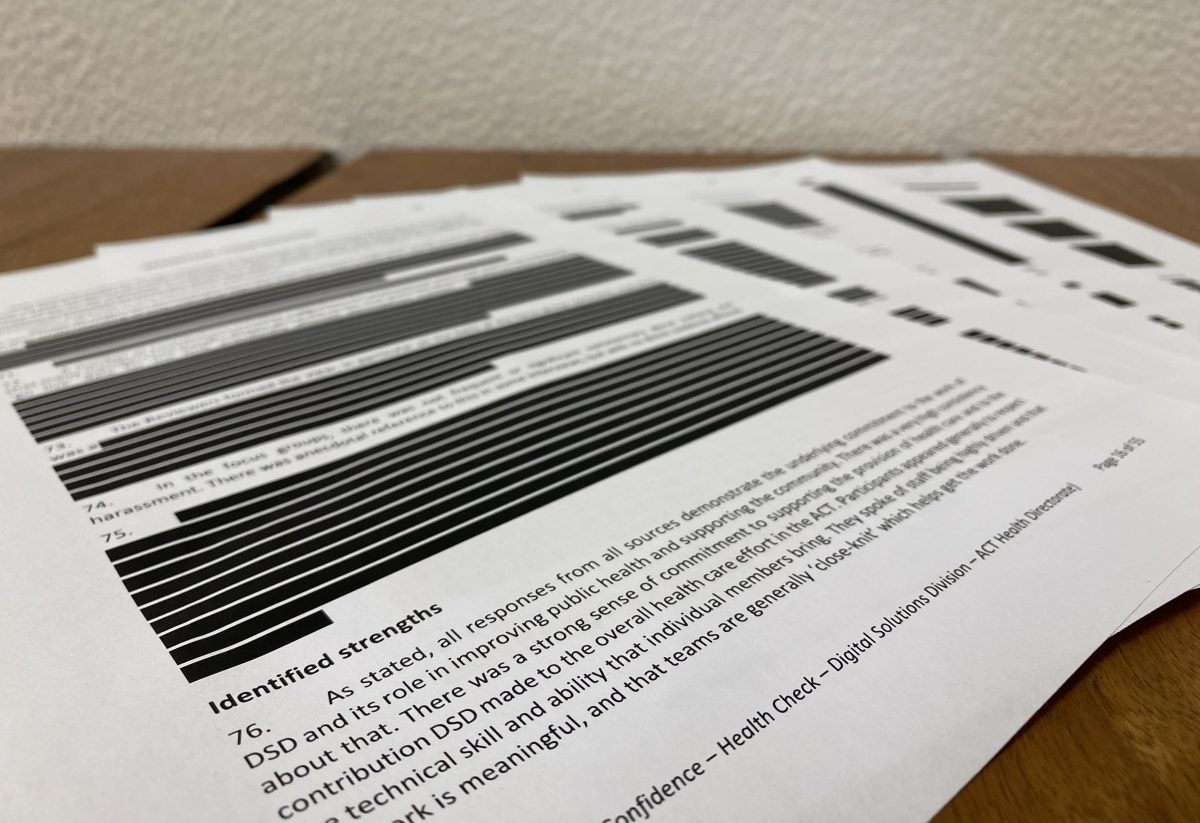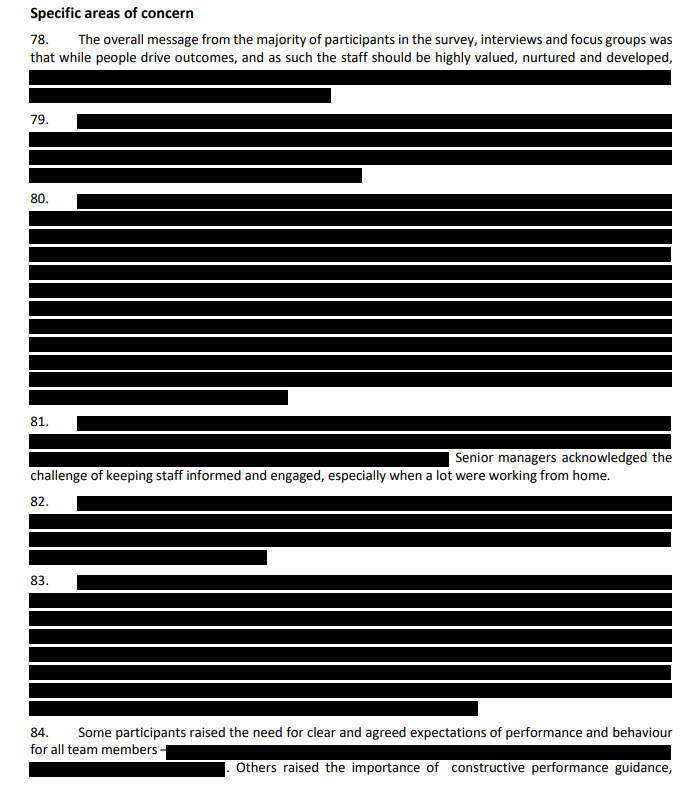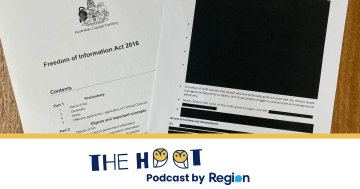
Positive sections of the Digital Solutions Division survey were released while negative ones were redacted. Photo: Claire Fenwicke.
The Freedom of Information Act 2016 was designed to give the fullest access possible to government documents in the name of transparency and confidence in political decisions.
But the Freedom of Information (FOI) process can be frustrating when trying to get a full range of documents and having them released covered in redactions – or having the request completely denied.
A directorate’s decision can be appealed by the ACT Ombudsman Iain Anderson and his office, and while he’s not concerned the legislation is being applied incorrectly, he admits there are instances where directorates should be applying the law more appropriately.
The Canberra Liberals’ shadow health minister Leanne Castley appealed an FOI decision by ACT Health around a staff survey of the Digital Solutions Division.
The directorate came under fire in April when it released positive comments from the survey but chose to redact negative ones over concerns they could “negatively impact” ACT Health.
ACT Health reasoned that releasing negative material would be contrary to the public interest. The Ombudsman overturned Health’s decision.
“[This decision was] contradicted by the release of the portions of the survey report which were more positive in their feedback compared to the redacted material,” Mr Anderson found.
“I consider that both the positive and negative feedback provided in the staff survey would contribute to an informed debate on an issue of public interest [such as this].
“An informed debate requires a balance of information be considered.”

The ACT Ombudsman varied the decision of ACT Health to redact sections of the Digital Solutions Division. Photo: Screenshot.
While Mr Anderson was satisfied ACT Health didn’t intend to make a decision based on potential reputational harm, he pointed out that balancing public interest factors wasn’t “merely a tallying exercise”.
“Rather than having a chilling effect on staff providing frank feedback, publication could also have a necessarily positive effect on response rates if honest and/or negative feedback is published and issues raised within said feedback is then acted upon by the agency,” his report noted.
“The FOI Act also has a pro-disclosure bias. The public interest test and weighing of factors is approached as scales’ laden in favour of disclosure’.”
Ms Castley described Mr Anderson’s decision as a “big win” for transparency.
“The Ombudsman comprehensively rebuffs ACT Health’s arguments for redacting my FOI,” she said.
“This will inevitably draw attention to this Labor-Greens government’s lack of transparency, especially when it comes to the many failures of the ACT public health system.”
She called on ACT Health to release the rest of the staff survey.
Region questioned Mr Anderson about his decision and whether he was concerned the FOI laws weren’t being appropriately applied by directorates.
He explained very few FOI review requests were made to his office, with only 55 applications made out of 1087 FOI decisions from all ACT government directorates in the most recent financial year.
Of those, 41 proceeded to the next stage, with a majority withdrawn due to informal resolutions. Overall, 11 decisions were varied, four were set aside and five were upheld.
However, Mr Anderson said there was one area directorates could improve when considering FOI applications.
“We often find agencies are focused on possible exemptions and they could do better in weighing up public interest in favour of disclosure rather than against disclosure,” he said.
“Often purely factual material can be disclosed as well.”
Overall, Mr Anderson said he felt the agencies applied the FOI Act in a “mature” way and advised his office to hold several forums and educational sessions to ensure directorates felt comfortable applying the legislation.
He also pointed out a large increase in the number of policy decisions and background information that had been released on the Open Access website, which can be an alternative to applying for an FOI decision.
In the 2021/22 financial year, 2143 decisions were published on the site. This jumped to 6099 publications in 2022/23.
“That’s actually pretty positive that a lot of agencies are actively engaging to publish information as much as possible,” Mr Anderson said.
However, he always encouraged people to get in touch if they weren’t happy with a disclosure decision.
“From time to time, different decision makers have different views.”
The next ACT Ombudsman annual report on the operation of the FOI Act 2016 is expected to be tabled to the Legislative Assembly on Friday (13 October).
Region contacted ACT Health to ask whether it would release more of the DSD survey, but didn’t get a definitive answer.
An ACT Health spokesperson said the directorate acknowledged the decision and was committed to balancing transparency and confidentiality of individuals.
“We acknowledge the ombudsman’s decision to disclose a larger proportion of the information and the findings that appropriately de-identified information can promote public debate and have a positive effect on change within the directorate,” they said.
“We are constantly endeavouring to improve the opportunity for staff to share their views and experiences, which includes the ability to participate in opportunities such as a Division Health Check in a safe and open way.”
While a review decision may be varied by the ACT Ombudsman, that doesn’t always result in information being released.

















